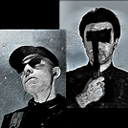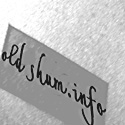Alexei Borisov
February 21st, 2010 by olkor received Comments Off on Alexei BorisovIn the eventful history of Russian underground music Alexei Borisov represents a prototype. At the beginning was “Centre”, Russia’s first new wave band. At the end of the 1980s Borisov, the “Centre” guitar player, born in Moscow in 1960, became the front man of the industrial electronic wave formation “Notchnoi Prospekt” (Night time Boulevard) and since 1992 together with Pavel Jagun he makes up F.R.U.I.T.S.
The group “”Notchnoi Prospekt””, that at an early stage started putting together their own instruments (e.g. a “vocooder”, a language synthesizer) and experimented with analogous appliances of Russian and Baltic origin, which they connected anew, was a cult band. In the period immediately after Perestroika they filled entire football stadiums. but received little attention outside the defined circle of Russian experimental music. This is a general problem as Borisov, a graduate in history and art history remarks: “The opinion is repeatedly voiced that Russian music is too “western”. For us the problem is that there is no music infrastructure in Russia.” Ever since computers became available at a reasonable price the CD-R has become the most important medium of distribution. Network thinking and Internet have made survival possible. As a consequence Borisov founded the Finnish-Russian label “N&B Research Digest” with Anton Nikilä.
One is rarely confronted elsewhere with such acoustic extremes as in Russia. Whereas the major cities are a Moloch drowning out everything else with its chaotic noise, on the lonely internal steppes the only noise is the sound of the blood coursing through ones ears. The metropolises such as Petersburg or Moscow are piles of electromagnetic refuse. It spills out of every crack mixing with Russia’s great musical inheritance left behind by Constructivism, Futurism and real Socialism. What is left? A kind of post-Perestroika sobering up phase, a result of the disintegration of shared anti consensus approaches. If not here then where else, outside the UK, could producing industrial music have made historical, ideological and social sense? The axis “Enthusiasm” (Vertov) – “Art Brut/ Musique Concrete” -“Industrial” had practically to be re-imported to Russia by means of blueprints such as Sergei Kuryokhin, Alexander Solshenitzyn, “Throbbing Gristle”, “Laibach” and, indeed, Alexej Borisov. If Glasnost achieved anything in musical terms then it was the fact that the idea of resistance had to be repositioned.
Alexei Borisov seems aware of history. Surreal and futuristic particles are found throughout his sound language. His art employs everyday life mixing it with linguistic absurdities in the spirit of the “Soviet Kafka”, Andrei Platonov and flanking it with abstract sequences of noise and electronica. This is illustrated in the equipment as well as in the song and recitation texts that he has cultivated for some time and which are full of cross-linked neologisms. Samples from sports broadcasts, old radio sounds, frequency noise, feedback and rhythmic patterns interrupted at several points are the tactics with which Borisov operates.
Tags: Alexei Borisov, Anton Nikilä, Centre, electronic wave, electronica, experimental music, industrial, N&B Research Digest, noise, Pavel Jagun, radio sounds, Russia, Russian underground, synthesizer
Posted under: Shum Info in other languages / Шум Инфо не по-русски . . . . . . . . . . . . . . . . . . . . . . . . . . . . . . . . . . . . . . . . . . . . Друзья! Мы представляем новый блог об электронной, экспериментальной, нестандартной музыке России и всего мира. Алексей Борисов/Олег Корнев. . . . . . . . . . . . . . . . . . . . . . . . . . . . . . . . . . . . . . . . . . . . . . . . . . . . . . . . . . . . . . . . . . . . . . . . . . . . . . . . . . . . . . . . . . . . . . . . . . . . . . . . . . . . . . . . . . . . . . . . . . . . . . . . . Dear friends! This is our new blog of electronic, experimental and unusual music from Russia and other countries.
Alexei Borisov/Oleg Kornev. . . . . . . . . . . .
. . . . . . . . . . . . . . . . . . . . . . . . . . . . . . . . . . . . . . . . . . . . Друзья! Мы представляем новый блог об электронной, экспериментальной, нестандартной музыке России и всего мира. Алексей Борисов/Олег Корнев. . . . . . . . . . . . . . . . . . . . . . . . . . . . . . . . . . . . . . . . . . . . . . . . . . . . . . . . . . . . . . . . . . . . . . . . . . . . . . . . . . . . . . . . . . . . . . . . . . . . . . . . . . . . . . . . . . . . . . . . . . . . . . . . . Dear friends! This is our new blog of electronic, experimental and unusual music from Russia and other countries.
Alexei Borisov/Oleg Kornev. . . . . . . . . . . .





